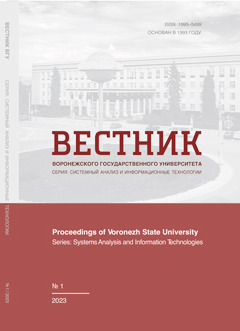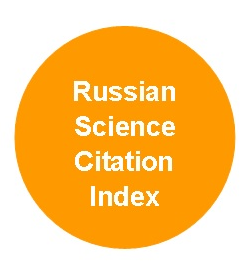О ковариациях случайных величин с нечеткими состояниями и их приложениях
Аннотация
Даны новые определения скалярных произведений, ковариаций, вариаций и коэффициентов корреляции случайных величин с нечеткими состояниями в терминах их центров и радиусов. Установлены свойства: симметрии, аддитивности и положительной однородности скалярных произведений и ковариаций, соответствующие аналоги неравенства Коши — Буняковского, характеристические свойства коэффициента корреляции. Изучена взаимосвязь между введенными ковариациями и скалярными произведениями, а также различными определениями метрик на множестве нечетких чисел и введенными вариациями. Показана связь с известными результатами. В качестве приложения рассмотрено решение задачи об оптимальной линейной регрессии случайных величин с нечеткими состояниями. В качестве другого приложения рассмотрена задача о преобразовании нечетко случайного сигнала линейной динамической системой.
Скачивания
Литература
2. Nahmias S. (1978) Fuzzy variables. Fuzzy Sets and Systems. Vol. 1. P. 97–110.
3. Puri M. L., Ralesku D. A. (1986) Fuzzy random variables. J. Math. Anal. Appl. Vol. 114. P. 409–422.
4. Körner R. (1997) On the variance of fuzzy random variables. Fuzzy Sets and Systems. Vol. 9. P. 83–93.
5. Feng Yuhu, Hu Liangjian, Shu Huisheng (2001) The variance and covariance of fuzzy random variables and their applications. Fuzzy Sets and Systems. Vol. 120, iss. 3. P. 487–497. – DOI
6. Näther W. (2006) Regression with fuzzy data. Computational Statistics and Data Analysis. Vol. 51. P. 235–252.
7. Colubi A., Coppi R., D’Urso P., Gil M. A. (2007) Statistics with fuzzy random variables. METRON – International Journal of Statistics. Vol. 65. P. 277–303.
8. Colubi A. (2009) Statistical inference about the means of fuzzy random variables: Applications to the analysis of fuzzy- and real-valued data. Fuzzy Sets and Systems. Vol. 160. P. 344–356.
9. Akbari M. Gh., Rezaei A. H., Waghei Y. (2009) Statistical inference about the variance of fuzzy random variables. The Indian Journal of Statistics. Vol. 71-B, Part 2. P. 206–221.
10. Shvedov A. S. (2016) Estimating the means and the covariances of fuzzy random variables. Applied Econometrics. Vol. 42. P. 121–138.
11. de la Rosa de Saa S., Lubiano M., Sinova B., Filzmoser P., Gil M. A. (2021) Location-free robust scale estimates for fuzzy data. IEEE Trans. Fuzzy Syst. Vol. 29, iss. 6. P. 1682–1694. – DOI
12. Khatskevich V. L. (2022) On some properties of fuzzy expectations and nonlinear fuzzy expectations of fuzzy-random variables. Russian Mathematics. V. 66, No 11. P. 86–96.
13. Averkin A. N. (1986) Fuzzy sets in control models and artificial intelligence. Moscow : Nauka.
14. Diamond Ph., Kloeden P. (1994) Metric spaces of fuzzy sets. Theory and applications. World Scientific.
15. Khatskevich V. L. (2020) Means, quasi-scalar product and covariance of fuzzy numbers. Journal of Physics: Conference Series. 012136.
16. Dubois D., Prade H. (1987) The mean value of fuzzy number. Fuzzy sets and systems. Vol. 24, iss. 3. P. 279–300.
17. Yazenin A. V. (2016) Basic concepts of the theory of possibilities. Moscow : Fizmatlit.
18. Viertl R. (2011) Statistical Methods for Fuzzy Data. Chichester : Wiley.
19. Khatskevich V. (2020) On Modification of the Law of Large Numbers and Linear Regression of Fuzzy Random Variables. International Conference on Stochastic Methods ICSM-5 2020: Recent Developments in Stochastic Methods and Applications. P. 76–91.
20. Shiryaev A. N. (2021) Probability. Moscow : MCNMO.
21. Ivchenko G. I., Medvedev Yu. I. (2019) Mathematical statistics. Moscow : Librokom.
22. Ventzel E. S., Ovcharov L. A. (2014) Theory of random processes and its engineering applications. 5th ed., reprinted. Moscow : KnoRus.
23. Khatskevich V. L. (2023) On continuous random processes with fuzzy states. Automation and Remote Control. V. 84, No 7. P. 687–698.
24. Seikkala S. (1987) On the fuzzy initial value problem. Fuzzy Sets and Systems. Vol. 24, iss. 3. P. 319–330.
25. Malinowski M. T. (2009) On random fuzzy differential equation. Fuzzy Sets and Systems. Vol. 160, iss. 21. P. 3152–3165.
26. Ho Vu (2017) Random fuzzy differential equations with impulses. Wiley. Complexity. 11 p. DOI https://doi.org/10.1155/2017/4056016
27. Osama M. A., Fadhel S. F., Mizal H. A. (2023) About the existence and uniqueness theorem of fuzzy random ordinary differemtial equations. Al-Nahrain Journal of Science. Vol. 26(2). P. 30–35.
28. Buckley J. J., Feuring T. (2001) Fuzzy initial value problem for Nth-order fuzzy linear differential equations. Fuzzy Sets and Systems. No 121. P. 247–255.
29. Krein M. G., Daletsky Yu. L. (1970) Stability of solutions of differential equations in a Banach space. Moscow: Nauka. 535 p. 30. Baskakov S. I. (2000) Radio-technical circuits and signals. Moscow : Publishing house “Vysshaya shkola”.
- Авторы сохраняют за собой авторские права и предоставляют журналу право первой публикации работы, которая по истечении 6 месяцев после публикации автоматически лицензируется на условиях Creative Commons Attribution License , которая позволяет другим распространять данную работу с обязательным сохранением ссылок на авторов оригинальной работы и оригинальную публикацию в этом журнале.
- Авторы имеют право размещать их работу в сети Интернет (например в институтском хранилище или персональном сайте) до и во время процесса рассмотрения ее данным журналом, так как это может привести к продуктивному обсуждению и большему количеству ссылок на данную работу (См. The Effect of Open Access).



















